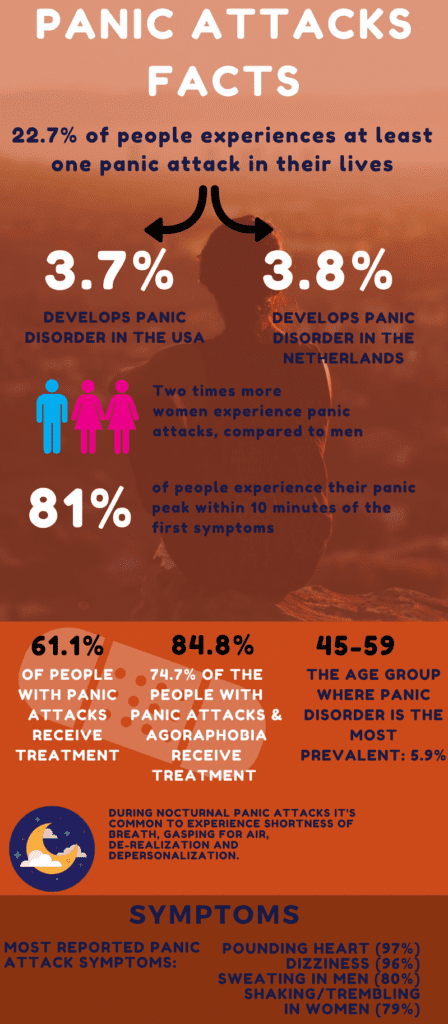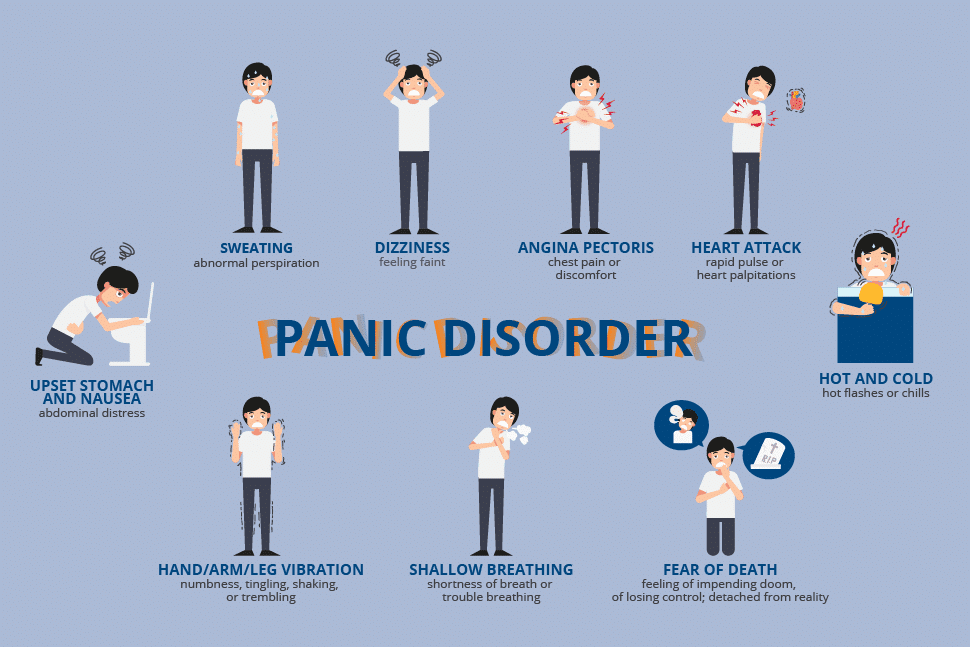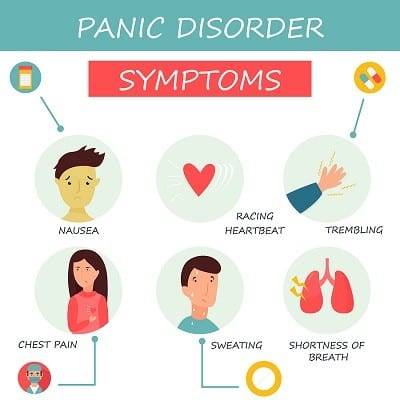The first step of solving a problem is finding its root cause, and having a question like “Is panic disorder genetic?” is the first step of digging deep into this disorder.
The arrival of mental health disorders is quite unpredictable. There are a lot of things our minds experience while passing through this struggling phase. Panic is one of the byproducts of a troubled mind. The sudden racing of the heart, shortness of breath, and lack of control over emotions might put one in a state of helplessness. But there is a way out of this situation. Knowing what’s bothering the mind in a state of panic and why it behaves a certain way, one can find the route to their healthier self.
As per the research, about 1.7% of the adult U.S. population aged 18 to 54 i.e. approximately 2.4 million Americans have panic disorder each year. The exact cause behind these numbers is unknown, but a variety of factors, such as childhood trauma, life events, or other chronic disorders are known to contribute to it. However, if this panic condition is inherited genetically,
Some suitable treatments and strategies can help one live a normal life despite its existence. Dig deeper into the blog below to find answers to “Is panic disorder genetic?” and discover strategies to manage it effectively.

Let’s talk about panic Disorder!
Any person with panic disorder experiences a constant state of fear and anxiety throughout their life. They become bothered and troublesome about small things. This feeling of anxiety that arises due to the disorder becomes uncontrollable and unmanageable. Panic disorder is often accompanied by frequent and unexpected panic attacks. It results in unusual behavior changes that can be a consequence of several factors. Genetics, stressful life events, past trauma, and underlying medical conditions are some of the factors that play a major role in its development. Panic disorder disrupts a person’s day-to-day life, affecting their job, relationships, and overall health. While there is no definitive reason for its existence, research suggests that it may be triggered by certain situations or by a combination of genetic, biological, and environmental factors. Does this raise the concern- Is panic disorder genetic in origin or are environmental factors more influential? Let’s discuss more about this ahead.

Is panic disorder genetic?
So far, there is no definitive evidence to support this notion. Various experimental studies have been conducted to identify whether Is panic disorder genetic. As per the study by NCBI, a family history of panic disorder has been consistently shown to increase the risk of panic disorder in people with a similar history. Twin studies have shown that identical twins who share all their genetic material have a higher rate of developing panic disorder than fraternal twins who share about half of their genetic material. However, this does not necessarily mean that genetics alone has a strong influence on panic disorder. In some cases, panic disorder can co-occur with other factors, such as traumatic experiences, chronic medical conditions, and records of substance abuse. Although no specific gene has been identified as the cause of the panic disorder, studies suggest that multiple genes may be responsible for the sudden onset of this disorder.
Symptoms of Panic Disorder

Avoidance of the disorder symptoms can aggravate the severity of one’s panic condition. Therefore, for a safe and timely treatment of panic disorder, it’s necessary to be familiar with the following symptoms:
- Frequent and unexpected panic attacks
- Physical sensations in the body such as sweating, trembling, or shaking
- Difficulty breathing normally
- Chest tightness or discomfort
- Always feeling faint, dizzy, or lightheaded
- Feeling numb or tingly sensations
- Fear of losing control or going crazy
- Being worried about the occurrence of panic attacks
- Being in fear of having a heart attack
- Impairment in occupational functioning
- Social withdrawal due to a panic condition
- Feeling detached from oneself and living in a state of paranoia.
Treatments for Managing Panic Disorder

Panic disorder takes control of one’s emotions, but there are ways to regain that control. Understanding “Is panic disorder genetic?” helps in preparing a customized treatment plan as per the individual’s condition. Here are some of the most effective methods and treatments to manage this condition effectively.
1. Cognitive-Behavioral Therapy
Cognitive-behavioral therapy is considered to be the most effective among all therapies for managing panic attacks. Research by the NCBI shows it effectively reduces panic symptoms and behaviors for over six weeks. It trains the person to confront their fear and get out of the continuous loophole of negativity.
2. Medications
Studies suggest that certain antidepressant medications make panic attacks less frequent and severe. There are different medications suggested, keeping in mind the severity of the attack. Selective Serotonin Reuptake Inhibitors are generally used as the first line of treatment for panic disorder. For co-existing conditions or if the patient is experiencing severe symptoms, benzodiazepine-based treatment is suggested until the antidepressant effects wear off. However, medication has side effects and must always be used under the guidance of a qualified medical professional.
3. Lifestyle changes
Small lifestyle changes have a great positive impact on one’s mental wealth. Research by the NCBI suggests that ongoing changes in behavior and lifestyle lead to symptom improvement. Introducing changes such as getting an adequate amount of sleep, maintaining a balanced diet, limiting caffeine and alcohol intake, and avoiding recreational drugs can speed up the recovery process.
4. Exercise and relaxation techniques
Doing things that make one feel good, like walking, running, swimming, or yoga, will help reduce the impact of panic on the body. The most common symptom of panic disorder is a panic attack. A study report by PubMed shows that exercise programs can help reduce the symptoms of panic attacks. Learning and practicing relaxation techniques like breathing deeply, gradually relaxing muscles, meditating, and being mindful help cope with sudden panic attacks.
FAQs
1. Is panic disorder genetic in origin?
There is no single yes or no to the question, “Is panic disorder genetic?”. Several factors influence it, and genetics can be one of these factors. If a person has a family history of disorders, they are more likely to have panic disorder, but it varies from person to person and depends on their circumstances.
2. Do panic disorders last a lifetime?
Though panic disorder is not a lifetime phenomenon, it can be long-lasting and therefore require ongoing management. With proper treatment and support, symptoms can diminish over time.
3. What percentage of panic disorder is genetic?
Various research has been done to determine if panic disorder is genetic, and it has therefore been concluded that it accounts for about 20-70% of the risk of panic disorder in an individual. However, it’s important to note that this percentage may not be exact and may vary greatly depending on the individual and their circumstances.
4. Can panic disorder be cured permanently?
There is no permanent cure for this disorder yet. However, medically, there are various options available to treat and reduce the symptoms.
5. What leads to panic disorder?
Is panic disorder genetic in origin, or are environmental factors, responsible for its existence? This question often arises while decoding the cause behind its onset. It’s hence found that there are various factors such as family history, lifestyle factors, past chronic conditions, stressful life events, etc that contribute to its development.
Conclusion
Now that one is aware of the influence of genetics on panic disorder development, it’s easier to take the right step toward its treatment. Understanding the root cause of panic disorder is essential for a speedy recovery. Every individual should ask themselves- “is panic disorder genetic or is it a consequence of other factors”?
Even if panic disorder is inherited, it should not be considered a disease but rather a condition that can be taken care of with the right supervision. If the symptoms of a panic attack are too difficult to manage on their own, one should seek professional help from a medical professional who can guide them through the process. Remember, there is no magic formula to fight panic attacks, one just learns to live with them better through strength and resilience.
At Calusa Recovery, we understand the profound impact that panic attacks can have on your well-being. Our comprehensive approach to mental health encompasses tailored treatment options designed to help you regain control over your life. Through evidence-based therapies, personalized strategies, and compassionate support, we guide you on a transformative journey toward managing and overcoming panic attacks.
















